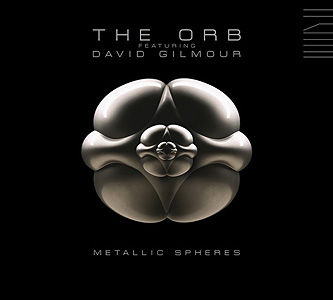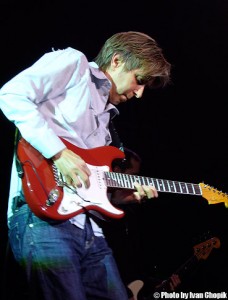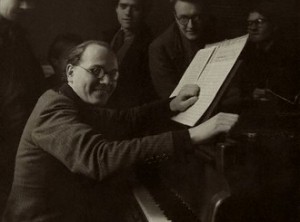 Alex Paterson is an unsung audio chemist. As the main brain of the musical collective known as The Orb, he first dosed the music scene back at the dawn of the nineties with a potent cocktail of house, dub, and electronic ambience. But while the scene he helped to define continues to branch off and redefine itself through a macrocosm of subspecies, Paterson remains the aural physician that prescribed so many of those now disparate elements as a single unified agent.
Alex Paterson is an unsung audio chemist. As the main brain of the musical collective known as The Orb, he first dosed the music scene back at the dawn of the nineties with a potent cocktail of house, dub, and electronic ambience. But while the scene he helped to define continues to branch off and redefine itself through a macrocosm of subspecies, Paterson remains the aural physician that prescribed so many of those now disparate elements as a single unified agent.
By taming the aggressively infectious grooves of house music with slower tempos, the band found a new space into which they poured Eno-esque washes of sound and bubbling Steve Reich melodies. The result was a new terra firma that contained the seeds from which the modern likes of deadmau5, Trent Reznor, and Massive Attack have grown.
Their latest album welcomes a fellow aural astronaut to their turf: Pink Floyd’s David Gilmour. While Gilmour’s last solo record, On an Island, had all the dreamy harmonies, lavish synth pads, and reverb-drenched guitar work that defined his old band, it floated – unchecked by Roger Water’s acerbic vocals and toothy compositions. The album sounded so light and airy that it often threatened to float right off the turntable. But within the confines of Metallic Spheres, he surrenders much of the writing duties, offering his six string services to more completely color The Orb’s beat-laden canvas.
The album itself is tailored for the vinyl experience, split into a slight two tracks that swell across almost fifty minutes. Each ‘side’ is divided into five songs named on the sleeve, so if you want to jump right to one you’d better be good at remembering time codes, and have a nimble finger on the fast forward button. But that would be defeating the purpose of an aural experience as vast and engrossing as the music contained within.
First impressions of the album will largely depend on which part of the album’s banner the listener salutes. Those rallying behind the words ‘featuring David Gilmour’ will likely be initially disappointed. But those who dutifully picked up the album as fans of The Orb will quickly lose themselves in the rabbit hole with those dubious Gilmour devotees soon tumbling after.
Here, Gilmour lashes out with few discernible guitar solos, and when he does they swim through the background. Even his rare vocals are restrained to several sparsely echoed samples. Instead, he fires out funk rhythms like a feather bullet machine gun, slides lap steel licks into the stratosphere, and pulls great mileage out of a single sustained note and a delay pedal with druidic efficiency. Make no mistake: this is not David Gilmour, master of melodic phrasing and lyrical solos whose work can be tabbed meticulously on paper and recited by the diligent guitar student. This is the inimitable David Gilmour, master of delicate touch and transcendental nuance – and this Gilmour can be matched by no other.
More so than any previous Orb outing, Metallic Spheres feels narrative, with Gilmour as the central character. Familiar furnace drones and laser bleeps roll through the opening as Gilmour conjures up whale songs through slippery bends and glacial volume swells. Synth bass hums in low like a slow-mo helicopter and before one could mistake it for the calm before the storm of ‘One Of These Days,’ the ambient washes retreat to make way for an undulating drumbeat.
Gilmour’s guitar manifests itself again and again, each time wearing a new sonic aesthetic and technique like a mask before slipping back into the swirling depths of the digital flotsam and jetsam. He inevitably reemerges with a new guise, dressed for the weather stirred up by the Orb during his absence – and it is this ebb and flow, this musical breathing that not only grants the album lungs, but legs as well.
Paterson and company are quick to riff on the sound tricks of Pink Floyd’s mature later albums. The two long-form sides are broken down further by the sudden imposition of drones and sonic shifts that at one instant sound like a mono 50’s speaker complete with tinny crackles and in the next revert to modern digital grandeur, ala Wish You Were Here. Spiritually, the album is perhaps closest kin to the studio side of Pink Floyd’s Umma Gumma, with its individual song sketches combining to create a far greater sum.
If you can allay the astronomical expectations that come with the ‘featuring David Gilmour’ brand, roll with Metallic Spheres. Pay close attention to how he balances what he plays with what he doesn’t play. Gilmour judiciously avoids the potential fretwork fireworks that would inevitably blot out the other elements. But while this musical sleight of hand may be at first off-putting, dim the lights, keep vigil between your speakers, and simply push play – you may just find yourself lost in one of this year’s most hypnotically compelling musical experiences.















